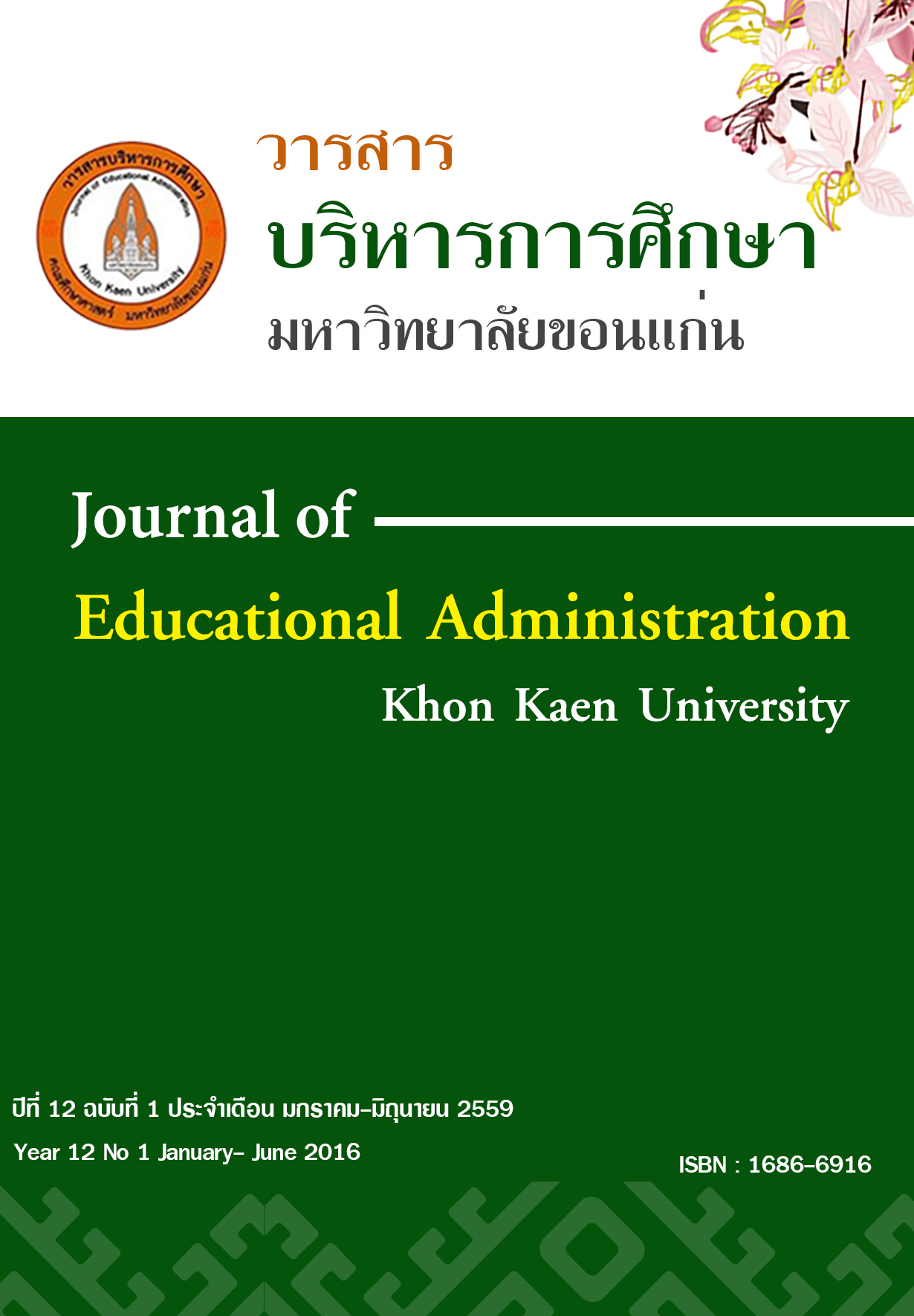ห้องเรียนของคนหลายวัย A Class of Different Ages
Main Article Content
Abstract
การวิจัยครั้งนี้มีวัตถุประสงค์ 1.เพื่อศึกษาปฏิสัมพันธ์ระหว่างกลุ่มคนในการเรียนรู้ร่วมกันของคนหลายวัยในอดีตถึงปัจจุบัน 2.เพื่อศึกษากระบวนการเรียนรู้ร่วมกันของคนหลายวัยในห้องเรียนของคนหลายวัย และ 3.เพื่อศึกษาพฤติกรรมของกลุ่มคนที่ผ่านการเรียนรู้ในห้องเรียนของคนหลายวัย กลุ่มเป้าหมายในการวิจัย คือ กลุ่มวัยเด็กและเยาวชน กลุ่มวัยแรงงานและกลุ่มผู้สูงวัย จำนวน 30 คน โดยใช้วิธีการคัดเลือกแบบเจาะจง พื้นที่วิจัยคือ ตำบลกำแพง อำเภอเกษตรวิสัย จังหวัดร้อยเอ็ด ใช้การวิจัยแบบผสานวิธี ประกอบกับการนำกระบวนงานวิจัยเพื่อท้องถิ่น ของสำนักงานกองทุนสนับสนุนการวิจัยมาประยุกต์ใช้ จากผลวิจัยพบว่า 1. ปฏิสัมพันธ์ระหว่างกลุ่มคนในการเรียนรู้ร่วมกันของคนหลายวัย ในอดีตมีปฏิสัมพันธ์กันดี วิถีการดำเนินชีวิตแบบเรียบง่าย มีการพึ่งพา การแบ่งปัน การถ่ายทอดภูมิปัญญาจากรุ่นสู่รุ่น ในปัจจุบันคนมีปฏิสัมพันธ์กันน้อยลง เพราะมีภาวะบีบคั้นทางจิตใจสูง ทำให้เลือกทางที่เหมาะสมได้ยาก เกิดปัญหาคนวัยกระโดด ครอบครัวแหว่งกลาง สัมพันธภาพในครอบครัวลดลง 2. กระบวนการเรียนรู้ร่วมกันของคนหลายวัยในห้องเรียนของคนหลายวัย มี 4 ขั้นตอน คือ 1) การศึกษาภาวะบีบคั้นทางจิตใจ 2) การพิจารณาให้เห็นความจริงของชีวิต 3) การระดมความคิดเพื่อสร้างทางเลือก และ 4) การเลือกทางที่เหมาะสม เกิดกระบวนการเรียนรู้ใหม่ และ 3. พฤติกรรมของกลุ่มคนที่ผ่านการเรียนรู้ในห้องเรียนของคนหลายวัย พบว่า กลุ่มวัยเด็กและเยาวชนเป็นคนที่ใฝ่รู้ใฝ่เรียน เป็นผู้ตื่นรู้ วัยแรงงานเป็นผู้เปิดใจรับการเรียนรู้เพื่อพัฒนาตนเอง ผู้สูงวัยเป็นผู้ที่มีจิตอาสา เสียสละแบ่งปัน ให้ด้วยความเต็มใจ พฤติกรรม ที่เกิดเป็นสิ่งที่ดี มีคุณค่า ช่วยสร้างเสริมความสุขระดับบุคคล ระดับครอบครัวและระดับชุมชนต่อไป
The research aimed to 1) study the interaction between groups of different ages in cooperative learning from past to present; 2) study the cooperative learning process of different ages in the classroom; and 3) study the behaviors of people who had learned in the class of different ages. Samples were groups of 30 people of different ages which comprised the children
and youth group, the working-age group, and the elderly group. Innovation driving areas were Ban
Nong Ang, Ban Dok Rak and Ban Sai Thong in Kamphaeng Sub-district, Kaset Wisai District, Roi Et. The research results present as follows. 1. The interaction between people in the groups of different ages in cooperative learning was found that in the past the people interacted with each other well. Their lifestyles were simple, as they depended on each other, shared knowledge, and transferred wisdoms from generation to generation. However, in the present people less interact with each other because they have so high mental stress that. It influences them to choose the right choice more difficultly. Consequently, there were problems such as skipping age, family’s trouble, and lower family relationships. 2. The cooperative learning process of different ages in the classroom consisted of 4 procedures: 1) studying psychological stress, 2) determining the truth of life, 3) brainstorming to create alternatives, and 4) selecting the proper way. Consequently, there was the new learning process 3. The behaviors of groups of people who had learned in the class of different ages were found that the children and youth were the group that thirsts for knowledge and learning. The working-ages were open to learning in order to better themselves. The elderly willingly volunteered, shared, sacrificed, and gave. The happened behaviors were good, valuable, and helpful to build up happiness for individuals, families, and the community.


